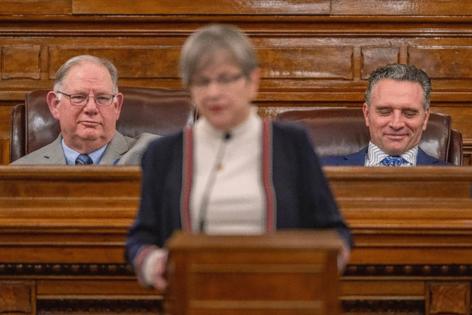Kansas Republicans send strict ban on gender-affirming care for trans minors to Gov. Laura Kelly
Published in Health & Fitness
TOPEKA, Kan. — Kansas Republicans sent a strict ban on specific health care for transgender minors to Democratic Gov. Laura Kelly, setting up for another veto-override fight over the lives and rights of LGBTQ Kansans.
The Kansas House and Senate voted Wednesday to approve a bill banning hormone therapy and gender transition surgery, often called gender-affirming care, for anyone under 18.
Kelly has promised to veto the bill when it lands on her desk. She and other Democrats have joined LGBTQ activists in steep opposition to the policy, which they say needlessly blocks access to lifesaving care for vulnerable youth.
“Talk about how stressful it is to be a trans kid,” Kelly told reporters earlier this month. “To be a kid who is going through that and then add on top of that the adults in the room, who are supposed to care about you, turning on you.”
Both chambers, however, may have the two-thirds majority needed to override Kelly. The Senate approved the bill with a veto-proof majority, while the House approved the bill 82 to 29, two votes short of a veto-proof majority. Two Republicans who previously voted yes on the bill were absent.
Last year, Senate Republicans failed to override Kelly’s veto on a similar bill, but the chamber appears to have enough votes after Sen. Brenda Dietrich, a Topeka Republican, changed her vote to yes because of language in the bill allowing minors to taper off their medication.
The bill is the latest in a string of policies in Kansas and red states across the country targeting the lives of transgender youth. Twenty-two states have restricted gender-affirming care for youth, according to the Human Rights Campaign. Last year, lawmakers overrode Kelly on legislation barring transgender athletes from girls' and women's sports and legally defining man and woman by sex assigned at birth.
“There are waves of fear going across this country about how their children are going to turn out if we continue to allow a small minute percentage of children to be affirmed,” Rep. Heather Meyer, an Overland Park Democrat and mother to a transgender child, said in debate in the House, arguing supporters of the bill hadn’t taken the time to understand the people they were impacting.
“So many families are terrified, and they are going to become refugees from this state.”
Major medical associations, including the American Academy of Pediatrics, have said gender-affirming care should be available to minors as “developmentally appropriate.”
Supporters of the proposal argued minors were too young to make decisions regarding hormone therapy or transition surgery, even in consultation with parents and physicians. Instead, they said, youth with gender dysphoria, a condition common among transgender individuals, should be treated for mental health concerns and allowed to transition after turning 18.
“The bias, as some people call it, is predicated on fear, fear of the unknown, and there is still a lot we don’t know about what we’re embarking on, particularly with minors,” said Rep. John Eplee, an Atchinson Republican and a family physician. He said that transition treatment was “somewhat of a trend” in the medical field.
“It’s time for us to say whether we want to slow that down or put a check on it or a balance on it.”
Sen. Mark Steffen, a Hutchinson Republican and anesthesiologist, compared hormone therapy and transition surgeries to the use of lobotomies in the 1940s and 1950s to treat mental health disorders.
“It is our utter and complete responsibility to protect these children from being disfigured permanently via medications or surgery,” he said.
But providers of hormone therapy and transition surgery say no patient jumps into gender-affirming care lightly. Extensive mental health care is provided to transgender youth before they begin puberty blockers and hormone therapy. Surgery, they say, is rare among minors in Kansas.
Amanda Mogoi, a nurse practitioner who provides gender-affirming care in Wichita, said the policy would block meaningful conversations between transgender youth and physicians about the best way to move forward. She worries about the future for her young patients if their medications are taken away from them.
“The truth is that these are life-saving medications,” she said.
The bill is likely to be challenged in court. The American Civil Liberties Union of Kansas has said repeatedly it would violate protections for bodily autonomy in the Kansas state constitution. But in the meantime LGBTQ Kansans have warned it will harm transgender youth currently in the state.
“When you pass legislation like this, you are holding the knife that is hurting kids,” said Iridescent Riffel, a transgender woman from Lawrence.
_____
©2024 The Kansas City Star. Visit kansascity.com. Distributed by Tribune Content Agency, LLC.







Comments